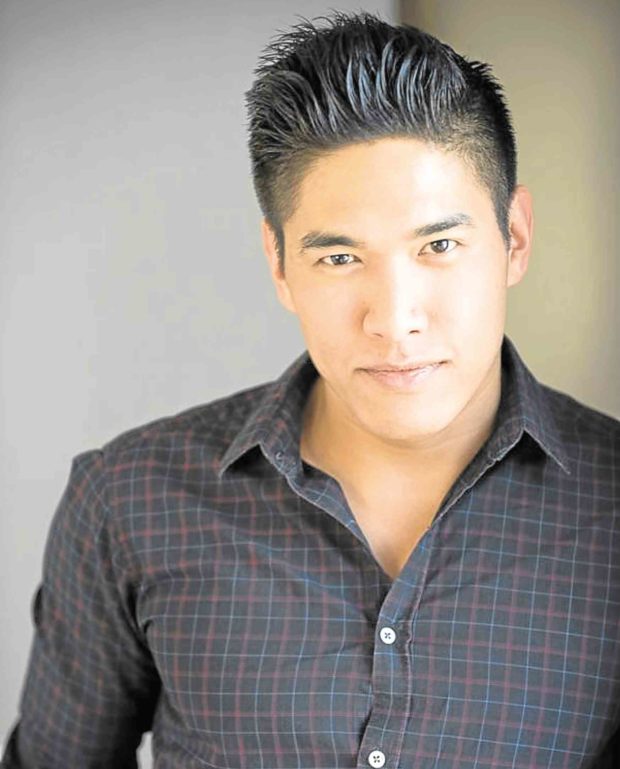A Fil-Am actor’s life: Cesar Cipriano
(Conclusion)
LOS ANGELES—“It has been a mixture of fulfillment, excitement and wonder, sprinkled with moments of frustration and thumb twiddling,” Cesar Cipriano summed up his journey so far as a Fil-Am actor in Hollywood.
Our first exposure—pun unintended—to Cesar was in the East West Players’ production of “La Cage aux Folles” in 2016. He played several roles, but it was as a dancer that he almost stole the show, along with Reuben Uy.
As go-go studs, Cesar and Reuben wore the briefest shorts, trunks or underwear throughout the musical. And even when playgoers were just arriving at David Henry Hwang Theater in Los Angeles’ Little Tokyo, the two dudes greeted guests in red Speedos.
Cesar, who grew up in Brooklyn, New York, lives in Santa Monica, California. Among his theater credits are the Los Angeles production of “Allegiance,” “Pacific Overtures,” “Hello Again,” “La Cage aux Folles,” “Romeo and Juliet,” “Othello” and the national tours of “Miss Saigon” and “The King and I.”
Article continues after this advertisementSome of his television credits include “Being Mary Jane,” “New Girl,” “2 Broke Girls,” “Parenthood” and, recently, the web series, “Pretty Dudes.”
Article continues after this advertisementHow would you describe your journey as an actor so far? It has been a mixture of fulfillment, excitement and wonder, sprinkled with moments of frustration and thumb twiddling. So far, the normal cycles of feast and famine have been pretty consistent for me. Auditions are coming up again.
We are filming Season 2 of the web series, “Pretty Dudes.” I am also staying in shape for some upcoming photo shoots.
How do you prepare for an audition? Any good luck rituals? My driving commutes consist of me listening to my prerecorded sides to get my lines in my head. That’s the only time I use an auditory method to learn lines. Otherwise, I study them from the page.
Preparation-wise, I block from the neck up what beats I’m planning for the scene, and if we audition in a medium shot, I expand that to waist level. I’m never married to the blocking, though. If I’m not feeling it, it doesn’t happen in the room. I want my responses to be as natural as possible. But blocking it for a close-up helps me memorize the lines.
If it’s a musical audition, learning new songs is tough. I can’t sight read and play the piano, so I have to call in favors to record a friend playing the piano.
I’m not superstitious at all, so I have no rituals. But I do adjust my body language in the audition room when I’m on deck.
What is the most frustrating part of trying to land roles in Hollywood? It’s the infrequency of opportunities when you’re a type (nonwhite). Also, there was a good window where I wasn’t getting auditions, but my fellow bilingual Asian colleagues were. Which means there was a wave of Asian characters being written as foreigners and not an English-speaking American. It’s two steps forward, one step back. Experiencing those back steps is frustrating, but it’s getting better.
How do you handle rejection? Honestly, I don’t even feel rejection. I forget about it. The “nos” in Hollywood don’t happen to your face. They just don’t call. Also, having an agent and manager further separates you from the rejection.
Sometimes, even when I get a no, I get feedback from my manager saying that they called to say I did good work. It rarely happens, but those few times when it did happen were enough to make me feel confident in the work I do.
Have there been times when you almost gave up? Never.
Do you, as an actor of color, feel that opportunities for minority actors are improving or getting worse? And do you think that the inclusion rider (mentioned by Frances McDormand in her best actress acceptance speech in this year’s Oscars, which is added to an A-list actor’s contract to ensure that the casting and production meet certain levels of diversity) is helping? I’d like to believe it’s getting better. We need inclusion riders until we feel as a community that we won’t need it anymore, because we would naturally operate that way. As long as we need terms like inclusion and diversity, then yes, we need them.
What’s your stand on whitewashing—or the casting practice in which white actors are cast in nonwhite character roles—in Hollywood? I’m totally against whitewashing, hiring hearing actors to play deaf, hiring cis gender to play trans, and the like. If you want the stories, hire the [right] people.
E-mail [email protected]. Follow him at https://twitter.com/nepalesruben.
